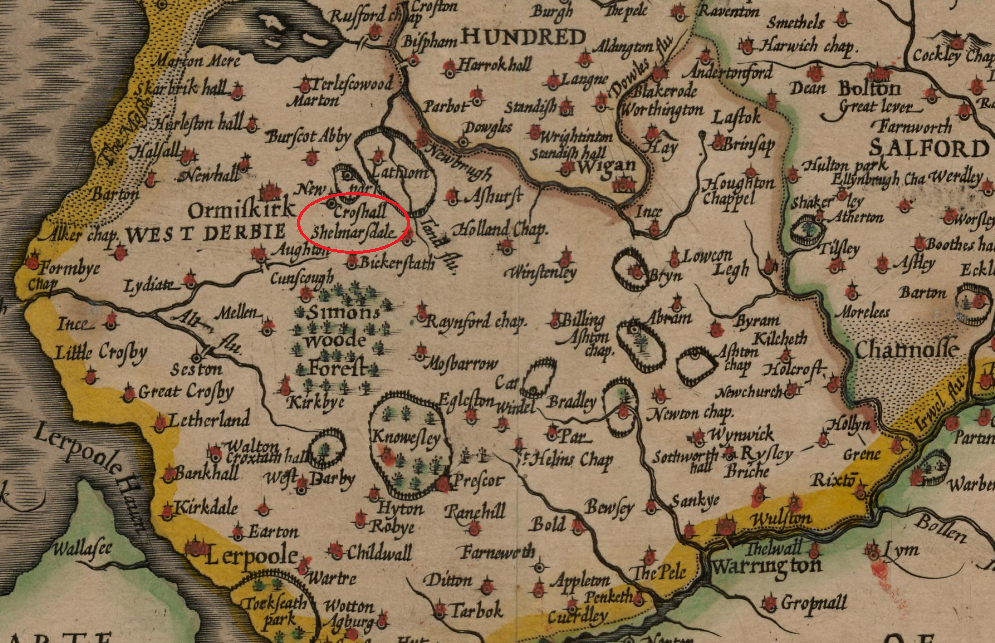Family of Shelmerdine Manchester Area
(Work in progress and being updated regularly.)
The name SHELMERDINE is a place name. People often think it is of Jewish German origin, but that isn't the case. The place Shelmerdine is located in the parish of Ormskirk, Lancashire, which is a corruption over time of present-day Skelmersdale.
The Domesday entry is recorded as 'schelmeresdele' in 1066. Its value is stated as 2 shillings and 7 pennies; there is no population given in the Domesday entry, and no mention of it being under the plough or waste, meaning it was not cultivated or being managed.

Phillimore's Doomsday book entry for Skelmersdale.
Before 1066, a Saxon named Uhtred held the Schemeresdele lands, which then passed to Roger de Poitou, a Norman noble, by 1086. Much of Lancashire was laid to waste by the Normans by that year. They systematically torched, murdered, and devastated the land as they advanced northward, due to continuous rebellion by the local Saxon lords. Roger de Poitou, along with the Molyneaux family—who later became the Earls of Sefton—was specifically chosen for the task of seizing control of what was regarded as a lawless area, the frontier at that time. Much later, the Stanley family would gain prominence in the area due to their marriage into the Lathom family of Lancashire.
In 1672, Skalmeresedel is named in John Speed’s map of Lancashire. The spelling has changed over time. Further confirmation comes from the frequency of the name within the Lancashire area and its prominence in Manchester throughout census returns and parish registers. Breaking the name down, its component parts bear similarities to some local geographical features: Skel-mers-dale and Shel-mere-dine. The area is/was full of meres (lakes), and it is a dale—a valley containing a stream—while "dine" is a corruption of "dale."

John Speeds Map of the County Palatine of Lancashire. 1672
Shelmerdine a Manchester Family
|
|
James Shelmerdine. b1842 & Emma Harrop. b1841
|
Joseph Shelmerdine. abt1808 & Alice Devonport. b1816
|
William Shelmerdine. b1774 & Mary. b?
|
William Shelmerdine. b1774 & ?
|
William Shelmerdine abt1755
Shelmerdine's & The Peterloo Massacre
Alice Davis b1908
William Watkin Davis & Elizabeth Ellen Hall-Lee
Association with Manchester
The Shelmerdines are in the thick of developing a Manchester that was driving the Industrial Revolution. They were part of it, and while they benefited from it, they also suffered from it. It wasn't until 1880, among other reform acts introduced to prevent the abuse of the lower classes, that the first family members began attending school, giving them a chance to pull themselves out of the lower end of the job market, where this branch of the family had been shackled since the early 1700s.
Other branches of the Shelmerdine family may have escaped the chains of bondage, as we see pockets of Shelmerdine families thriving and even venturing into the colonies abroad, but certainly not this family line. We see the family benefit from the social reform acts that took place during the Victorian period, which improved social housing, sewage containment, gas lighting and cooking, warm homes, fresh running water, transport links, and general infrastructure as the city grew and prospered. This isn't an exhaustive list of social improvements; such advancements continued from the 1950s through the 1970s and into the future to ensure the masses aren't left behind due to social injustice.
The living conditions endured by our branch of the family, given their lowly status at the bottom of the social hierarchy, are well illustrated in texts, old drawings, and photographs from the 1700s, which cover church events and their occupations over time, confirming their lowly status. Such accounts and evidence can now be viewed online, providing context for what our branch of the family lived through. While it wouldn't have all been bad times, the volatility of weather, crop failures, disease, and unemployment made life a roller coaster to endure.
We are also fortunate that the parish church registers recorded births, allowing us to trace our lineage through time. It was important to register all your children's births in the parish to ensure that if they fell on hard times, they could apply for "parish relief," along with yourself being "of this parish."
If your birth wasn't registered in the parish, you ran the risk of being ineligible for parish relief during difficult times. The irony is that the lower classes are only remembered by name through charity, as there are costs associated with marriages, burials, and christenings—events that were crucial for belief and potential financial relief
Compiled by Rob M Contributors and sources : Jenny nee' Shelmerdine. Alice Shelmerdine from original data source 1995. Extractions from parish registers held at Manchester Central Library and Ancestory.com amongst other data sources imbedded into this website. email: rob